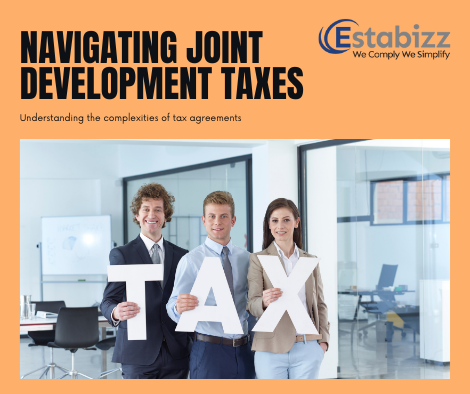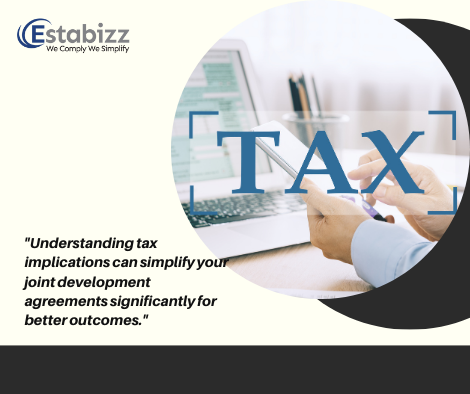Navigating Taxes in Joint Development Agreements: A Comprehensive Guide
Estabizz Fintech Pvt Ltd delves deep into the complexities of taxes in Joint Development Agreements (JDAs), providing landowners with essential insights to manage their tax liabilities effectively.

Understanding the Basics of JDAs
Joint Development Agreements represent a collaborative venture where a landowner partners with a builder, exchanging land for construction expertise and a share of the completed project. This seemingly straightforward arrangement, however, introduces several tax considerations that landowners must navigate.
The Significance of Land Transfer in JDAs
A critical tax event in JDAs is the transfer of land possession. For instance, let’s examine a scenario involving Mr. A, who engages in a JDA, agreeing to transfer his land for both a share in the construction and a monetary compensation. The agreement lays down the construction of four flats, allocation details, and a completion timeline.

Tax Liabilities Unfolded
- Capital Gains Tax: With the introduction of Section 45(5A) of the Income Tax Act, 1961, the capital gains tax is deferred until the completion certificate is issued. Mr. A’s capital gains tax liability would thus be calculated based on the combined value of the flats received and monetary compensation, against the indexed cost of acquisition of his property.
- Calculating Capital Gains: Taking Mr. A’s case, if the reconstructed flats are valued at ₹1 crore each, and with added sales proceeds, the total consideration amounts to ₹3.20 crore. Deducting the indexed cost, Mr. A faces a tax liability, highlighting the tax implications upon the project’s completion.
Tax Planning Strategies
- Section 54 and 54F Benefits: Owners can leverage these sections to potentially offset gains, underscoring the importance of strategic planning in JDAs.
- TDS Considerations: For the advance payment received, TDS will be deducted, which Mr. A can adjust while filing his income tax returns.
Exploring GST Implications
JDAs attract GST on two fronts: the transfer of development rights and construction services. The responsibility to discharge GST lies with the developer, offering relief to landowners. Yet, understanding GST’s mechanics remains crucial for both parties.
- GST on Development Rights: The developer bears the GST on the transfer of development rights, calculated on the fair market value, discounting the land value.
- GST on Construction Services: Paid before the issuance of the completion certificate, GST rates vary based on the project type, with distinctions made between affordable and non-affordable residential apartments.
- Selling Under-construction Units: If a landowner decides to sell units before completion, GST implications should be meticulously considered to ensure compliance and optimization of tax liabilities.
Given the comprehensive overview provided in the initial revision, the coverage of taxes in Joint Development Agreements (JDAs) appears thorough. However, to ensure completeness and address any potentially overlooked aspects, it’s prudent to delve deeper into specific strategies and considerations that can further aid landowners in optimizing their tax positions.
Advanced Tax Planning Considerations
Utilizing Advanced Payments Strategically
- Advance Payment Management: The advance payment received by landowners, subject to TDS, can be strategically reinvested to generate income until it needs to be accounted for in tax calculations. This tactic can help leverage the deferred capital gains tax, providing an opportunity for growth.
Impact on Future Sales
- Long-term Sales Strategy: When planning to sell the constructed units, understanding the long-term capital gains implications and the possibility of availing exemption under Section 54GB by reinvesting in eligible startups can offer substantial tax benefits.
GST Clarifications for Seamless Transactions
Understanding Reverse Charge Mechanism
- Landowner’s GST Exemption: Delving deeper into the GST implications, it’s important for landowners to fully grasp the concept of the reverse charge mechanism. This ensures clarity on their part of non-liability, primarily focusing on the developer’s obligations towards GST compliance.
Real Estate Regulatory Authority (RERA) Compliance
- RERA’s Role in GST Rates: With GST rates varying based on the project’s classification under RERA (Real Estate Regulatory Authority) guidelines, awareness and compliance with RERA can not only influence GST rates but also impact project timelines and overall transparency.
Preparing for Project Delays
- Proactive Measures for Delays: Given the possibility of project delays impacting the tax liabilities timeline, landowners should consider setting aside funds or exploring tax-saving investments to mitigate the potential financial strain from delayed completion certificates.
Collaborating with Experts
Partnering with Financial Advisors
- Leveraging Expertise: Engaging with tax professionals and financial advisors, like those at Estabizz Fintech Pvt Ltd, can provide personalized strategies catering to individual circumstances, helping to navigate the dynamic tax landscape of JDAs effectively.
Continuous Education and Awareness
- Staying Informed: The tax laws and regulations governing JDAs are subject to change. Staying updated with the latest tax rulings and amendments is crucial for both landowners and developers to ensure compliance and optimize tax outcomes.
Conclusion: The Path Forward with Estabizz Fintech Pvt Ltd
In the realm of Joint Development Agreements, the interplay between capital gains tax, GST, and the intricacies of project execution underscore the need for meticulous planning and expert guidance. At Estabizz Fintech Pvt Ltd, we champion the cause of empowering landowners through tailored financial strategies, leveraging our in-depth understanding of the tax implications of JDAs. By fostering informed decision-making and strategic investment, we aim to turn tax liabilities into opportunities for growth and prosperity.
By staying vigilant, proactive, and informed, landowners can master the taxation landscape of Joint Development Agreements, turning potential challenges into avenues for financial success with the expertise and support of Estabizz Fintech Pvt Ltd.
Mastering JDAs with Estabizz Fintech Pvt Ltd
At Estabizz Fintech Pvt Ltd, we understand the nuanced tax landscape of Joint Development Agreements. Whether it’s capital gains intricacies, leveraging tax benefits, or navigating GST requirements, our expertise guides landowners through each step, ensuring informed decisions and optimized tax outcomes. With strategic planning and understanding, landowners can navigate the complexities of JDAs confidently, capitalizing on their investments with clarity and efficiency.
Estabizz Fintech compiled the material in this article using the most recent Acts, Rules, Circulars, Notifications, Provisions, Press Releases, and material applicable at the time. They ensured the completeness and correctness of the material through due diligence. When using this material, users must consult the relevant, applicable legislation. The given data may change without prior notice and does not constitute professional advice. Estabizz Fintech disclaims all liability for any results from the use of this material.






